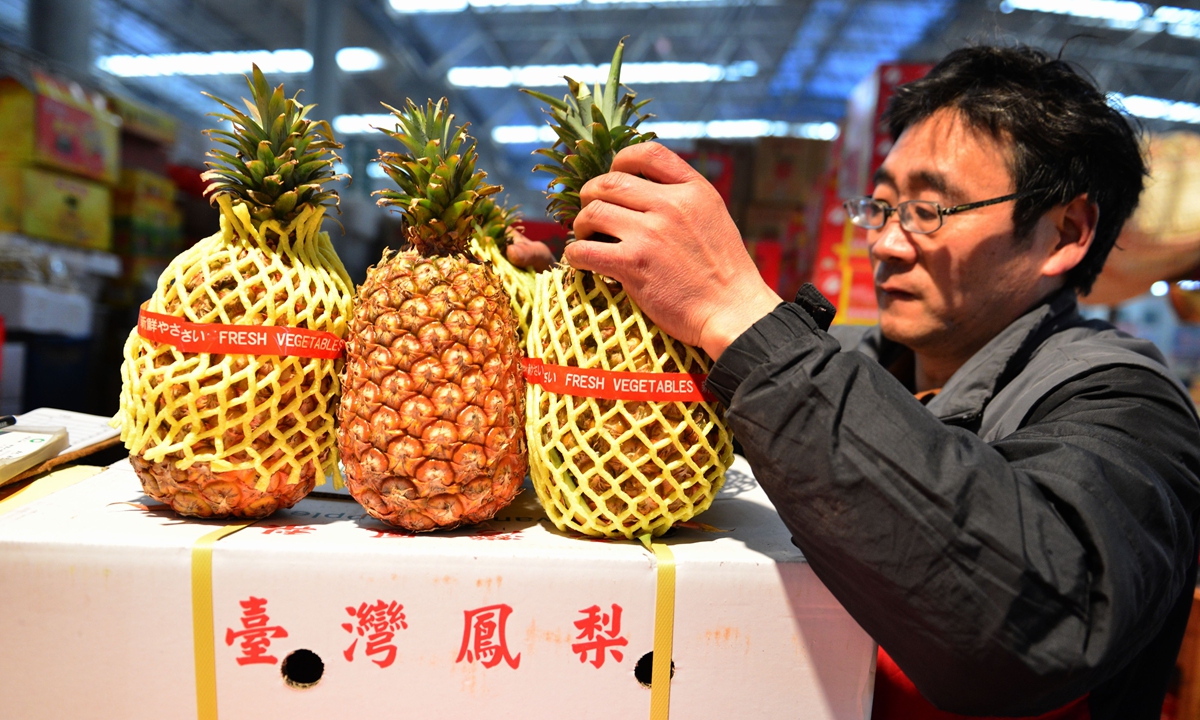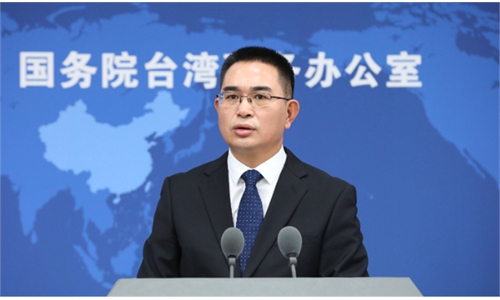DPP authorities undermine cross-Straits trade, even as island of Taiwan benefits from ECFA

Taiwan pineapple in a supermarket in Yiwu, East China's Zhejiang Province Photo: VCG
The island of Taiwan recently released data showing that the region had seen more than $10 billion in tariff reductions from the Chinese mainland after 13 years of the implementation of the Economic Cooperation Framework Agreement (ECFA), highlighting the massive benefit from cross-Straits trade for the island.
Despite such huge benefits, the Democratic Progressive Party (DPP) authorities have continued to undermine the political foundation for the ECFA and broader cross-Straits economic and trade exchanges by imposing illegal restrictions on mainland imports, which hurt the interests of enterprises and consumers on the island, experts warned.
Data from the Taiwan region's ECFA Service Center showed that the island received $10.1 billion in tariff reductions from the Chinese mainland under the ECFA during the past 13 years, while the mainland had only received $1.08 billion in tariff reductions from the Taiwan island during the same period.
While the ECFA, signed in June 2010 based on the 1992 Consensus, has proven enormously beneficial to the Taiwan region's economy, the DPP authorities have hindered cross-Straits economic exchanges and refused to acknowledge the 1992 Consensus, severely undermining the political foundation and conditions for the ECFA, experts said.
The ECFA led to a stark inequality in tariff benefits between the Chinese mainland, and the Taiwan island, Tang Yonghong, a deputy director of the Taiwan Research Center at Xiamen University, told the Global Times on Sunday.
Under the ECFA, the Chinese mainland agreed to reduce tariffs on 539 products from the Taiwan region to zero after two years, while the Taiwan region only reduced tariffs on 267 products from the Chinese mainland, resulting in the Taiwan region enjoying greater economic benefits.
"Despite benefiting greatly from cross-Straits trade under the ECFA, the DPP authorities have consistently imposed discriminatory trade barriers on products from the Chinese mainland," Tang said.
Under WTO rules and the ECFA, the Taiwan region is required to provide the Chinese mainland with equal export treatment and opportunities, but the island has been increasing its restrictions on Chinese mainland products, banning the import of 2,509 Chinese mainland products as of November 2023, data from the Ministry of Commerce of China (MOFCOM) showed.
A Chinese mainland spokesperson on March 13 said that the mainland had agreed to implement the early harvest program, despite the Taiwan region's restrictions on Chinese mainland products, showing the mainland's goodwill.
The DPP authorities' policies not only violated the ECFA and WTO rules but also harmed Chinese mainland' industries. On December 15, 2023, the MOFCOM determined that these restrictions constituted trade barriers, following an investigation into the Taiwan region's trade restrictions.
As a result, the Chinese mainland announced the termination of tariff preferences for 12 items from the Taiwan region under the ECFA starting from January 1, 2024. The MOFCOM recently disclosed that additional measures are being considered, including suspending tariff concessions for the Taiwan region in various sectors such as agriculture and fisheries, machinery, automobile parts and textiles.
"The DDP authorities have benefited from the ECFA while violating its provisions and those of the WTO, leading the Chinese mainland to suspend tariff reductions on certain products," Tang said.
Meanwhile, the DPP authorities' restrictions have hurt Taiwan enterprises and consumers, experts noted.
The Taiwan region's ban on more than 2,500 Chinese mainland products has caused shortages, increased living costs on the island, and negatively affected local businesses, Li Fei, director of the Research Center for Hong Kong, Macao, and Taiwan Region Studies at Xiamen University, told the Global Times.
Li noted that lifting cross-Straits trade restrictions and accepting affordable Chinese mainland products would help reduce living costs and support industrial chain development.
Tang stressed that the Chinese mainland has been the Taiwan island's largest export market and main source of its trade surplus, and if cross-Straits trade is affected, the DPP authorities will bear responsibility for the impact on local businesses and the well-being of the people in the Taiwan region.



